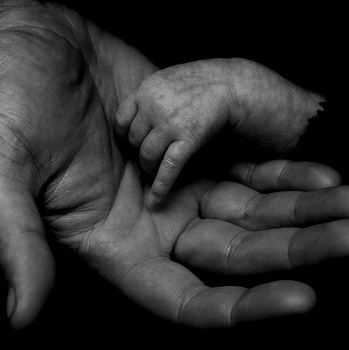 Kenneth Braswell, executive director of Fathers Incorporated, recalled an event when his daughter was in the second grade. While playing at school she tripped and cut herself. Instead of screaming for her teacher, she yelled for her father.
Kenneth Braswell, executive director of Fathers Incorporated, recalled an event when his daughter was in the second grade. While playing at school she tripped and cut herself. Instead of screaming for her teacher, she yelled for her father.
“More than remembering that she fell and scraped her knee,” Braswell said, “she remembered more that I wasn’t there to console her through that moment of pain.”
Braswell, the author of “When the Tear Won’t Fall,” has served as a board member for the National Fatherhood Leaders Group, Unified Progress International Education and the Fathers and Families Coalition of America, among other organizations.
Many fathers, Braswell said, suffer from a lack of resources and support. The dearth of options and opportunities becomes deeper as one moves “up and down the socioeconomic ladder and across cultural confines,” he said.
Low-income fathers, Braswell said, generally have difficulty obtaining employment, education and housing. The greatest struggle they face, he believes, is in maintaining relationships when financial resources may not be in place to support a family’s needs.
“There’s no shortage or lack of desire in men to want to be great fathers,” he said. “The question is whether or not they have the capacity to do so.”
United States Census Bureau data indicates that a third of the nation’s young people live in homes without their biological fathers. But the social ramifications of that father absenteeism can be severe, according to Carlos Alcazar, chairman of the National Fatherhood Initiative (NFI).
“Children from father-absent homes are two to seven times more likely to live in poverty, fail in school, be abused or neglected, become teen parents, become involved in the criminal justice system and abuse alcohol and drugs,” he said in an e-mail interview.
Founded in 1994, the NFI raises awareness about the ramifications of absent dads on the nation’s youth.
“Ensuring that the public understands that there is a father-absence problem affecting 24 million children is a key first step,” he said. “Evaluations of these programs, such as our InsideOut Dad program for incarcerated fathers, shows that they are effective in increasing the pro-fatherhood attitudes and knowledge.”
Research, he said, indicates that children with absent fathers are four times likelier to live in poverty than those in two-parent homes.“The poverty rates are roughly 40 percent and 10 percent, respectively,” Alcazar stated.
“We have not had a chance in this field of work to really deal with the emotion and pain that is developed when a child doesn’t have one or both of their parents in their lives,” Braswell said. “It’s difficult being the individual you want to be in life, given that you don’t have that person in your life, but it is so much more difficult when you’re trying to be that person through anger and pain.”
The uptick in inner city violence, he said, generally occurs in communities where father absenteeism is prevalent.
“As for education, children from father-absent homes are nearly twice as likely to drop out of high school than children in two-parent homes,” Alcazar said. “After taking into account race, socioeconomic status, sex, age and ability, high school students from single-parent households were 1.7 times more likely to drop out than the corresponding counterparts living with both biological parents.”
Children with absent fathers, he continued, were also at elevated risk for substance abuse.
“No matter what their gender, age, family income and race/ethnicity,” he said, “adolescents not living with both parents, biological or adoptive, are 50 percent to 150 percent more likely to use substances, to be dependent on substances and to need illicit drug abuse treatment than adolescents living with two biological or adoptive parents.”
Braswell said he learned how to “be a man” from limited experiences with male role models. As a result, he said he made a lot of mistakes that perhaps would not have been as severe if he had a permanent father figure around. He believes children with both parents in their lives are happier and more engaged, with a greater ability to express themselves.
Braswell’s own experiences with an absent father, he said, motivated him to be a better father to his children. Ultimately, he believe fathers who abandon their children are rejecting one of life’s greatest experiences.
“There is nothing like being able to look into a child’s eyes and know that child is full of everything that you have deposited into them,” Braswell concluded. “You are missing out on probably the biggest joy that you could possibly have.”
The roles fathers play in the lives of their children, Alcazar believes, are “unique and irreplaceable.“ For the absent fathers, he offers frank advice.
“It is never too late to work to become the involved, responsible and committed father your children need, despite any mistakes you may have made in the past,” he concluded. “We need more fathers in the home, and we need fathers in the home to be skilled and involved in their children’s lives.”
Photo courtesy of Anthony Kelly / Flickr





























